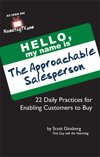If you want to reach the world.
If you want to make a name for yourself.
If you want to win with the people who matter most.
You have to use your hand, and you have to use your heart.
And I know what you’re thinking.
Great. Is he going to get all touchy feely now?
Yes.
That’s exactly what’s going to happen, because that’s exactly what people crave.
To feel like they’ve been touched.
How many of your people don’t feel touched?
How many of your people don’t feel at all?
AND JUST SO YOU KNOW: I’m not suggesting you start hugging everyone you meet.
Nor am I suggesting you formulate a touchpoint strategy for managing the customer experience that aligns with the brand promise. Excuse me while I vomit.
Being touchy feely is much bigger – and better – than that. It’s about leaving people feeling seen, heard and essential. Today we’re going to talk how to make yourself, your brand and your organization more touchy feely:1. Give people the experience of psychological visibility. You look with the eyes, but you see with the heart. And if you want to assure that you leave people feeling seen, try these ideas. First: Instead of going out of your way to make people feel invisible, make a conscious effort to love, honor and acknowledge them. When they get you, give them all of you.
Second: While engaging with people, resist the urge to check your email. Stop looking over their shoulder to see if there’s somebody more important to talk to you. Just be with the people you’re with, right now. Third: When someone comes to you with their problems, understand that they’re not looking for advice – they’re looking for understanding. Don’t dispense answers when they’re looking for affirmation.
Nothing touches people more than your willingness to be a mirror. When was the last time you slowed down and noticed people?
2. Be open to all levels of intimacy. I recently read the classic article in Harvard Business Review that first called customer intimacy a “key value discipline.” Their research proved that organizations that align their entire operating model to serve that discipline are the ones who become market leaders. Are you pushing yourself relentlessly to sustain it? If not, you’ll never touch your people in the way they need to be touched.
After all, each of your relationships – from customers you’ve known since day one to prospects you’ve known since this morning – is an ongoing laboratory of learning how to love. And it’s more than memorizing a few pieces of personal information. Intimacy is about sharing vulnerability, showing feelings and showering acceptance. It’s about weathering storms together, experiencing meaningful connection and creating emotional closeness. What would be different if that described the relationships you had with your customers?
3. Slow down. You can touch what you can’t catch. And you can’t feel what you can’t follow. If you want others to have a warmer, richer experience when they’re around you, learn to pump the brakes. Shift into neutral if you have to. Otherwise you’ll continue borrowing from approachability to fund velocity. And whatever meager dividends remain will leave people feeling untouched.
A helpful question to ask throughout your day is, “Why am I rushing?” Odds are, you won’t come up with a good answer. You might not slow down right away. But this friendly mental disruption will create a newfound awareness. And before you know it, communicating with you will become a more relaxing experience. Remember: When people come into contact with you, it should be emotionally rewarding – not physically draining.
Haste doesn’t make waste – it makes people feel ignored. What elements of your daily routine could be slower?
4. Bring people center stage. I love hearing the word no. Not because it’s an opening to sell, but because it’s an opportunity to hear somebody’s story. Because sometimes that’s all people want – an audience. Someone to champion their humanity. Someone to gather with them and say, “I’m here. I’m with you. I’m part of this.”
The secret is: If you truly want to touch someone, it’s not enough to request their story. You also have to receive it, respect it and retell it. Otherwise they may as well be winking in the dark. That’s what I love about blogging: It provides a public forum where I can bring other people’s story center stage. Often without their knowledge, but never without their acknowledgment.
In my experience, this is the perfect way to use technology for getting touchy feely. As long as you treat people’s truth accurately and respectfully, they’ll never feel untouched. People can’t live without a story to tell. How often you handing them the microphone?
5. Hold up your homework. When my friends Laszlo and Kelly got married, they wrote their own vows. Their words were beautiful, romantic and heartfelt. Not a dry eye in the house. But the collective heart of the entire room stopped beating when Laszlo made the following announcement right after they kissed: “Ladies and gentleman, we’re going to take a ten minute break before the reception starts because, frankly, those vows took everything we had.”
And rightly so, too. Doing something that touching isn’t easy. But the lesson learned is: When something takes everything you have, tell people. Not to boast about how strong you are. But to offer validation that they are people worth caring about, showing up for and giving yourself away to. When was the last time you went out of your way to tell someone that you went out of your way?
REMEMBER: Every day our world becomes less humane in our treatment of each other.
I know touchy feely isn’t easy.
I know touchy feely isn’t for everybody.
But it sure beats avoidy ignory.
LET ME ASK YA THIS…
Who are you touching?
LET ME SUGGEST THIS…
For a list called, “7 Ways to Out Experience the Competition,” send an email to me, and you win the list for free!
* * * *
Scott Ginsberg
That Guy with the Nametag
Author, Speaker, Entrepreneur, Mentor
[email protected]
 Sick of selling?
Sick of selling?
Tired of cold calling?
Bored with traditional prospecting approaches?
Buy Scott’s book and learn how to sell enable people to buy!
Pick up your copy (or a case!) right here.

 I never had a real job.
I never had a real job.